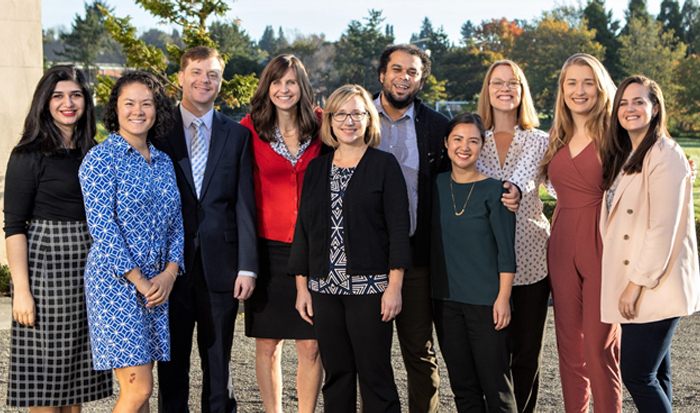First panel featuring (from left to right) Andy Nicholas, Michael Mitchell, and Misha Hill
By April Dickinson, Washington State Budget & Policy Center
Advocates, community leaders, and students packed the room for the Washington State Budget & Policy Center’s Budget Matters Policy Summit on October 2 at the Northwest African American Museum in south Seattle. The half-day summit focused on how to advance racial equity with tax policy, and it opened with a call for solidarity by All In For Washington Director Juan Jose Bocanegra. This message resonated throughout the day as summit attendees were encouraged to connect with each other and across communities to join the movement for economic justice.
There were two panels featuring national and local tax policy experts and community leaders. Misha Werschkul, executive director of the Washington State Budget & Policy Center, moderated the first panel focused on the racist impacts of tax policy and the solutions that can move us forward. Misha Hill from the Institute on Taxation and Economic Policy shared that all states in the U.S. have regressive, or upside-down tax systems – in which the people with lowest incomes are expected to pay the highest rates in state and local taxes – and that Washington just happens to be the worst. Michael Mitchell of the Center on Budget and Policy Priorities explained how our county has a long history of using the tax structure at the federal level to keep communities of color from having access to financial opportunity. And Andy Nicholas of the Washington State Budget & Policy Center reiterated how the racist legacy of economic policies in Washington – from employment discrimination to housing segregation – is still being felt by far too many communities of color today.
Washington State Budget & Policy Staff outside of the Northwest African American Museum
Andy discussed some of the findings of the new Budget & Policy Center report focused on how Washington’s tax code can be used to help advance racial justice into the future. He and the other panelists shared a number of policy solutions to address the harms of our tax code. The solutions include enacting a Working Families Tax Credit in Washington state. This credit would put cashback in the pockets of people who work hard for low wages. The policy would help almost a million Washington households keep up with the rising cost of living, and it would make a difference for many immigrant and refugee families (as Ayanle Ismail noted in his previous op-ed about the Working Families Tax Credit in Runta News).
The second Budget Matters panel included members of organizations from across Washington who represent communities of color and specifically immigrant and refugee communities. They spoke about how tax policy decisions are felt every day. Ramon Torres of Familias Unidas por la Justicia shared powerful personal testimony about immigrant farm workers. They are our neighbors, they contribute to our economy, and they pay taxes into the system, Ramon said, but they get unequal services from that tax revenue – like, for example, when a farm worker gets injured on the job and it’s nearly impossible to get financial and medical support for the disability. Sameth Mell of the Coalition of Immigrants, Refugees, and Communities of Color said that it’s really important that economic justice movements be holistic and consider the impacts to people’s daily lives who are struggling to make ends meet. Brenda Rodriguez Lopez of Central Washington Justice For Our Neighbors said that lawmakers need to ensure that tax money is helping provide critical services to communities because there are too many families who can’t afford to have food on the table.
Both panels highlighted the importance of communities of color having a lead voice in recommending economic policies in our state. Community representation is critical for lawmakers to make equitable decisions about where to invest state tax revenue. And during a question-and-answer conversation, panelists and attendees discussed how essential it is for communities of color, immigrants, and refugees to be fully counted in the 2020 census. Having an accurate count will ensure that there is adequate funding for the programs that communities rely on – like schools, buses, and public health services.
Find out more about the importance of an accurate census count and visit budgetandpolicy.org to find out more about the work of the Washington State Budget & Policy Center.
Second panel featuring (from left to right) Spanish-to-English interpreter Claudia Castrejon, Ramon Torres, Sameth Mell, and Brenda Rodriguez Lopez.








